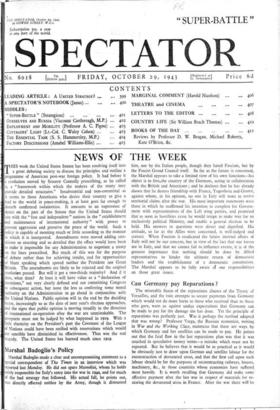HIS week the United States Senate has been resolving itself
into
NEWS OF THE WEEK
a great debating society to discuss the principles and outline a programme of American post-war foreign policy. It had before it a resolution moved by Senator Connally prescribing, as he called It, a "framework within which the makers of the treaty may provide detailed structures." Insubstantial and non-committal as it seems to those Americans who desire their country to give a lead to the world in peace-making, it at least goes far enough to disturb confirmed isolationists. It amounts to an expression of desire on the part of the Senate that the United States should join with the " free and independent " nations in the " establishment nd maintenance of international authority " with power to prevent aggression and preserve the peace of the world. Such a policy is capable of meaning much or little according to the manner in which it is interpreted. Amendments were moved adding con- ditions so exacting and so detailed that the effect would have been to make it impossible for any Administration to negotiate a treaty on the lines prescribed. But much of this was for the purpose of debate rather than for achieving results, and for opportunities of blunt speaking which spared neither the President nor Great Britain. The amendments are likely to be rejected and the original resolution passed. But will it get a two-thirds majority? And if it does, what then? At least it will have value as a " declaration of intentions," not very dearly defined and not committing Congress to subsequent action, but none the less as conferring some moral authority on the Administration to go ahead in conjunction with the United Nations. Public opinion will in the end be the deciding actor, increasingly so as the date of next year's election approaches, and the signs that public opinion is moving steadily in the direction of international co-operation after the war are unmistakable. The prospects must not be judged by what happened in 1919. With a little elasticity on the President's part the Covenant of the League of Nations could have been ratified with reservations which would not sensibly have diminished its effectiveness. That was the real tragedy. The -United States has learned much since 1919.


























